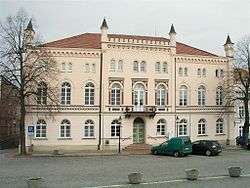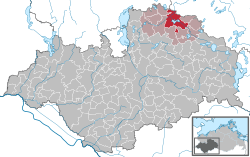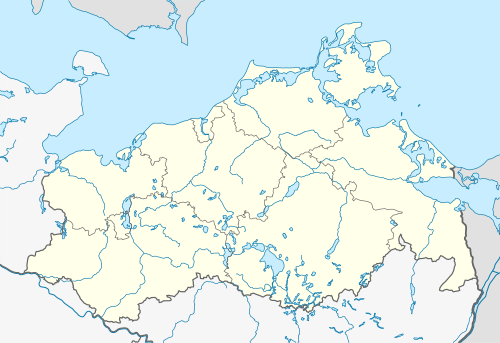Sternberg, Mecklenburg-Vorpommern
Sternberg (German pronunciation: [ˈʃtɛʁnbɛʁk]) is a town in the Ludwigslust-Parchim district of the state of Mecklenburg-Vorpommern.
Sternberg | |
|---|---|
 Town hall | |
 Coat of arms | |
Location of Sternberg within Ludwigslust-Parchim district  | |
 Sternberg  Sternberg | |
| Coordinates: 53°42′N 11°49′E | |
| Country | Germany |
| State | Mecklenburg-Vorpommern |
| District | Ludwigslust-Parchim |
| Municipal assoc. | Sternberger Seenlandschaft |
| Government | |
| • Mayor | Jochen Quandt |
| Area | |
| • Total | 67.67 km2 (26.13 sq mi) |
| Elevation | 40 m (130 ft) |
| Population (2018-12-31)[1] | |
| • Total | 4,157 |
| • Density | 61/km2 (160/sq mi) |
| Time zone | CET/CEST (UTC+1/+2) |
| Postal codes | 19406 |
| Dialling codes | 03847 |
| Vehicle registration | PCH |
| Website | www.stadt-sternberg.de/ |
History
The town of Sternberg was founded during the Ostsiedlung[2] by duke Pribislaw I,[2][3] who chartered the town with German town law in 1248.[3] In the vicinity of the town are the remains of three earlier, Slavic settlements (near Groß Raden and Sternberger Burg within the current city limits, and near Groß Görnow). The Slavic settlement and ramparts near Groß Raden have been excavated and reconstructed and serve as a well-known open-air museum for the Slavic era.
Suzerainty over Sternberg was transferred from Pribislaw to the Prince of Mecklenburg following Pribislaw's expulsion in 1255. Sternberg became the favorite residence of duke Heinrich II. (the Lion) in 1310. In 1492, 27 Jews were burned on the Judenberg after being charged with Eucharistic Sacrilege, a fictitious crime used in Jewish pogroms throughout medieval and renaissance Europe. On June 20, 1549, the Reformation was introduced in Mecklenburg as a result of a special council (Landtag) on the Sagsdorfer Bridge in Sternberg. In 1628, during the Thirty Years' War Albrecht von Wallenstein held council here.
Geography
The city is located southwest of Rostock, southeast of Wismar, and northeast of Schwerin. It is located near the Warnow River.
People
- Albrecht Tischbein (1803-1881), German shipbuilder
References
- "Statistisches Amt M-V – Bevölkerungsstand der Kreise, Ämter und Gemeinden 2018". Statistisches Amt Mecklenburg-Vorpommern (in German). July 2019.
- Foster, Elżbieta; Willich, Cornelia; Kempke, Torsten, eds. (2007). Ortsnamen und Siedlungsentwicklung. Das nördliche Mecklenburg im Früh- und Hochmittelalter. Forschungen zur Geschichte und Kultur des östlichen Mitteleuropa. 31. p. 42.
- Berger, Dieter, ed. (1993). Duden. Geographische Namen in Deutschland. p. 251.
External links
- (in German) Official Sternberg Website
| Wikimedia Commons has media related to Sternberg. |